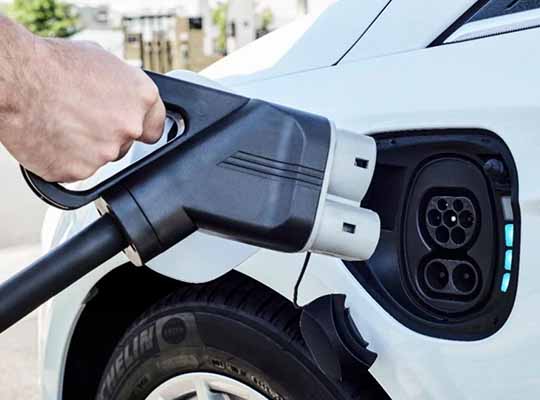As e-mobility continues to gain traction in both consumer and commercial markets, the role of EV charging connectors in protecting the electrical grid, vehicle functionality, and financial transactions from security breaches is becoming very important. Organizations such as UL, ISO, and IEC are working to standardize and meet these goals. Alongside protecting charging processes, safeguarding financial transactions is also important in charging infrastructure. Most EV drivers who charge on the road have to sign up in advance for charging networks to access paid chargers. Level 2 and Level 3 chargers require payment, often using membership cards that link charging networks to a financial network capable of processing credit card payments. To counter this challenge Tesla comes up with a connector pair that enables drivers to pull up to a Supercharger and plugin, instantly sharing information that allows the Supercharger to identify the specific car and link to the financial system for contactless payment. The intelligence embedded in Tesla’s proprietary connector configuration allows Tesla to set up Supercharging stations that do not have employees to manage cash or charge transactions.
Electric Vehicle Charging Connector Industry Procurement Intelligence report, by Grand View Research, deep dives into the following insights from the industry:
- Favorable government initiatives for sustainable development, rising demand for electric vehicles to aid the growth of EV charging connector market – Demand for electric vehicles is expected to increase at 20% CAGR from 2021 to 2025, driving the need for EV charging connectors. Moreover, the increasing efficiency of electric vehicles is expected to create a significant opportunity for market growth in near future.
- The global EV charging connector market is fragmented, with strategic partnerships between large and mid-sized or small-sized companies – An increase in mergers and acquisitions, coupled with diffused customer concentration, has enabled EV charging connector suppliers to secure add-on offerings to realize growth in new geographies. The Asia Pacific region holds the highest share of the global EV charging connector market, thanks to China’s position as the leading sourcing destination due to its low-cost manufacturing.
- Raw material costs make up the bulk of the cost head, accounting for close to 11% of the total cost – Raw materials, energy, and labor are three major cost components (~60%) of EV charging connector manufacturing. In most cases, the EV charging connector body is made of thermoplastic and it holds the highest share (20%) among raw materials.
- North America and Europe are the leading importers of connectors due to the increasing demand for electric vehicles – The U.S. has been one of the largest importers of electric connectors for the past 5 years. In the wake of the U.S.-China trade war, the U.S. has been moving its supply chains to Japan and South Korea, which are comparatively expensive sourcing destinations.
Electric Vehicle Charging Connector Industry Cost Intelligence – Key Components:
Grand View Research has identified the following key cost components for availing EV charging connector manufacturing:
- Raw Materials
- Thermoplastic
- Tough Pitch Copper
- Brass
- Stainless Steel
- Others
- Energy
- Labor
- SG&A Overheads and R&D
- Working Capital
- Taxes
- Profit
Raw material, labor, and energy are the major cost components of an EV Charging Connector, accounts more than 60% of the total cost of manufacturing.
Electric Vehicle Charging Connector Industry Supplier Intelligence – Capability based ranking & selection criteria with weightage:
Operational Capabilities –
- Years in Service – 15%
- Geographical Service Presence – 25%
- Employee Strength – 5%
- Revenue Generated – 7%
- Key Industries Served – 34%
- Key Clients – 5%
- Certifications – 9%
Functional Capabilities –
- Socket Type – 35%
- CHAdeMO
- GB/T
- Combined Charging System (CCS)
- Others
- Charging Locations – 15%
- Individual house
- Collective building
- Corporate
- Public
- Charging Time and Electricity Consumption – 50%
- Low
- Medium
- High
List of key suppliers in the electric vehicle charging connector industry:
- TE Connectivity
- Robert Bosch GmbH
- Siemens
- Tesla
- Fujikura Ltd.
- HUBER+SUHNER
- YAZAKI Corporation
- Sumitomo Corporation
- ABB
- Schneider Electric
Addon Services offered by Grand View Research:
- Should Cost Analysis – In the EV charging connector industry procurement intelligence report, we have estimated and forecasted pricing for the key cost components. The body of the charging connector, which is majorly made up of thermoplastics, is one of the key raw materials for EV charging connector manufacturing. Other raw materials like copper, brass, and stainless steel also hold a significant cost-share in connector manufacturing.
- Rate Benchmarking – Type and voltage of the connectors are some of the most important aspects while analyzing the rate benchmarking of an EV charging connector. In the EV charging connector market procurement intelligence report, we have analyzed the rates of CHAdeMO, CCS, and Type 2 EV charging connectors by using rate benchmarking analysis.
- Salary Benchmarking – Our research indicates that Tesla Senior Production Manager/Engineers earn 25%-30% higher salaries than Senior Production Manager/Engineers from other industry leaders like Bosch and TE Connectivity. However, the YoY increment rate in such companies largely depends on KRAs..
- Supplier Newsletter – It is cumbersome for any organization to continuously track the latest developments in their supplier landscape. Our newsletter service helps them remain updated, to avoid any supply chain disruption which they may face, and keep a track of the latest innovations from the suppliers. Outsourcing such activities help clients focus on their core offerings.
A smart and effective supply chain is essential for growth in any organization. Pipeline division at Grand View Research provides detailed insights on every aspect of supply chain which helps in efficient procurement decisions.
Our services include (not limited to):
- Market Intelligence involving – market size and forecast, growth factors, and driving trends
- Price and Cost Intelligence – pricing models adopted for the category, total cost of ownerships
- Supplier Intelligence – rich insight on supplier landscape, and identifies suppliers who are dominating, emerging, lounging, and specializing
- Sourcing / Procurement Intelligence – best practices followed in the industry, identifying standard KPIs and SLAs, peer analysis, negotiation strategies to be utilized with the suppliers, and best suited countries for sourcing to minimize supply chain disruptions
Browse through Grand View Research’s collection of procurement intelligence studies:
- Electric Vehicle Battery Industry Procurement Intelligence Report – Rising demand for electric vehicles, backed with favorable government policies is expected to drive growth for the EV battery market.
- Third-party Logistics Market Procurement Intelligence Report – Rapid adoption of logistics software and IT applications, to increase distribution coverage, is expected to boost the demand for 3PL services globally. Suppliers are also positioning themselves for growth by collaborating with freight payment and audit companies to more efficiently handle time-consuming tasks such as back-office freight payment processing.
SAN FRANCISCO — The global electric vehicle charging connecter market is expected to witness a boost at 19% CAGR from 2021 to 2025, as fuel prices are rising across the world. Electric vehicles have become the most obvious alternative for both consumer and automotive manufacturers. The global sales of electric vehicles in 2020 have crossed a 2 million mark despite the Covid-19 pandemic. Moreover, the sales are expected to increase by 20% to 30% in 2021. APAC and Europe are leading the market with 56% and 28% share respectively followed by North America (16%). This growth is majorly propelled by the favorable government policies in many countries. For instance, Chinese regulations enable the automakers in the country to meet their annual new vehicle efficiency standards by purchasing emissions credits that are generated by the sale of EVs, with the rate of credit higher for vehicles with advanced performance such as greater battery efficiency or range, but lower for plug-in hybrids.











